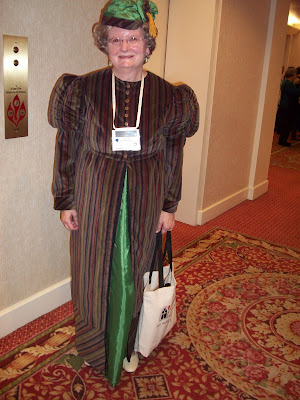
Naming Your Fictional Character
by Linore Rose Burkard
Do you struggle to find the right name for a character when writing? Is there
such a thing as a "right" name? And if there is, how do you know when you've
found it?
The answer to these questions can only be subjective, but here's my personal take
on them, as well as some of my favorite ways to find names when I need them.
First of all, I think most writers do struggle at times with naming one or more
characters. If you've never struggled with this, be grateful. If you have, it
probably means that you had a good idea about the sort of character you
were naming, and you were smart enough to recognize that not just any ol' name would do.

When I am in need of just the 'right' name for a character, I usually use a stand-in or temporary
name until I find the right one. (The temporary name isn't important, so use whatever you like,
but I would avoid going with "Character A" and "Character B"--these are cardboard-flat names and
won't help you envision your character at all.) If you get really stuck on what the "right" name
should be, it may help you to do some further brainstorming about that character. The better you
get to know this person, the easier it will be to settle upon a name that feels right.
One of my tricks is to search catalogs with lots of models (both male and female) until I find a face
that really matches my idea for a person. Once I have a face, I can usually decide upon a name.
Some writers use baby name books, but I don't find these helpful until I have a face in mind, first. I also find
that movie credits sometimes contain wonderful names. I never borrow anyone's full name, but I find
both a first name and a surname that I like, and combine them to get that "just right" name for
my character.

Each writer really needs to find what works for them.
Secondly, is there such a thing as a "right" name? A "wrong" one?
Again, this is partly subjective, but in some cases, such as with historical novels, it is more
a matter of being period-correct.
Some things to consider when choosing a name are:
a) Will it make the reader stumble each time they encounter it? Some historical novelists choose names
that are period-correct but impossible to pronounce unless you "know" that period. Don't make reading
your book a chore! Find a name that is both correct for the time and place of your novel, while also
going easy on readers. If you must use an obscure name, or one that has an obscure spelling, use another
character to let us know exactly how the name should be read.
b) Check that the name was in existence for the period you are writing in. Many authors check to see
if the name was
popular during a given period, but this is not necessary in many cases. The fact that it existed
is technically all you need to know; however, when naming a Puritan, you wouldn't want to try something
like "Crystal" when names such as Mary, Patience, and Charity were really the vogue. If you were trying
to emphasize the singularity of a character, the difference between him and her and the average person
of the world they live in, then a very different-sounding name might be just right, however.
So, the story-line plays a part in naming.
c) I'll never forget this lesson from T.S. Eliot: He wrote a heart-tugging poem called, "The Love Song of
J. Alfred Prufrock." Say that name aloud! It is anything but romantic, anything but what one would
associate with a love song, and the poem indeed conveys Prufrock's utter inability to "sing" one, even
when opportunity and desire are there. Eliot named this character carefully. The awkward name emphasizes
the pathos of the character. Can you do this in your fiction?
It's not by accident that romance writers try to choose pretty, or exotic, or smooth-sounding names for
their heros and heroines. Give a girl a pretty name, and it's easier to see her as attractive. Give a hero
a strong name, and it's easier to see him as strong.

Interestingly, you might want to choose the name for your villain as carefully
as for the hero or heroine. A villain often disguises him or herself as a hero or heroine, at least for some
portion of a book, and until they are found out, a beautiful name will go far to fool the reader. Conversely,
an uncertain name, one that is not particularly evocative or attractive (think: Clark Kent) can be used
to de-emphasize the real hero or heroine until they are revealed for their true colors later in the book.
There's also the idea that evil can appear beautiful, and a lovely name for a villain can make for
fun reading. In my book,
The House in Grosvenor Square, the good-looking villain's name is Lord Wingate, or Julian.
Neither sound ominous, but "Julian" has a sort of mysterious air to it, which I think supports the character's
persona.
You shouldn't need to obsess over naming a character, for it is much easier to get a "right" name than
a wrong one. Only historical novels can objectively be accused of having a "wrong" name--either for their
time or place--but do try to fit the appellation with the person. Get something that fits. Give a pretty girl
a pretty name, and a hero a strong name--unless it is part of their appeal or story that they have a "wrong" name and triumph anyway
(such as in the Johnny Cash song, " A Boy Named Sue").
Above all, have fun naming your characters! Find a method you like, whether it be an internet search,
a baby-name book, movie credits, or any other source, and have at it. Experiment with different names for the
same character if you're just not sure, and see what sits best with you. Eventually, you will find the "right" name
for each character, and your book will be stronger for it.
All rights reserved. You may copy this article only if you use it in its entirety and include "written by Linore Rose Burkard" AND link to the website: http://www.LinoreRoseBurkard.com












































